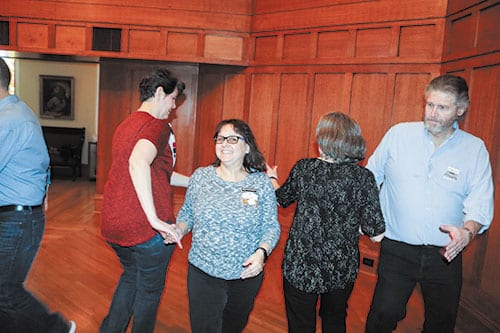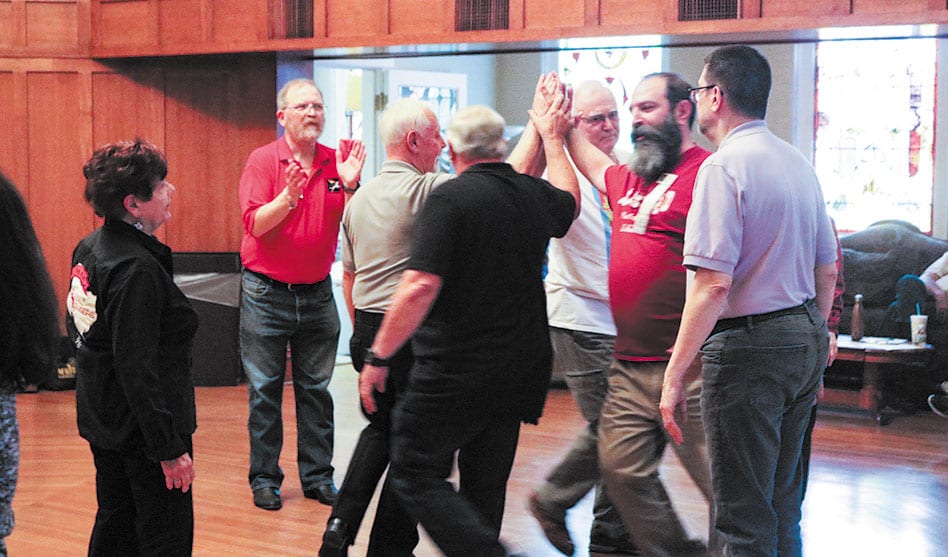Pegasus Squares dance at Grace United Methodist Church. (David Taffet/Dallas Voice)
Pegasus Squares hosting Scoot Back to Big D event this weekend
DAVID TAFFET | Senior Staff Writer
taffet@dallasvoice.com
Square dance, explained Pegasus Squares’ former president Alan Josephson, is “not a set dance.” It is, instead a set of calls, from the “caller,” telling the dancers what to do next.
The caller calls steps from a list of known moves, and dancers follow his or her instructions to create an intricate pattern of moves and steps.
To participate in the lowest level of square dance, a dancer needs to know about 70 calls, Josephson said. The highest level has thousands of calls. To prepare new dancers, Pegasus Squares will launch 10 weeks of lessons later this spring.
This weekend, Pegasus Squares is hosting Scoot Back to Big D, a fly-in, as members call it, or weekend event that the group hosts every other year in rotation with the Lone Star Lambdas, Austin’s LGBT square dance club.
Pegasus has been around since 2013, created after LGBT square dancing had been absent in Dallas for about 10 years. Josephson, who helped form the current group, was also a member of Big D Longhorns, which danced from 1995 until 2003.
The current group is a member of the International Association of Square Dance Clubs, which has about 60 member clubs around the country. In addition to Dallas and Austin, San Antonio has an active LGBT square dance group.
The main difference between LGBT and straight square dance is the position. A square is made up of four couples. In traditional square dance, the man begins on the left and the woman on the right. That formal configuration helps ensure no man would touch or dance with another man.
 In LGBT square dancing, it doesn’t really matter which part a dancer takes.
In LGBT square dancing, it doesn’t really matter which part a dancer takes.
Some people have a preferred position, Josephson explained, and dance either the “boy part” or the “girl part,” as square dancers call it.
Josephson said many LGBT square dancers are bi-dancual — dancing either part. But, he said, it really doesn’t make much difference in dance steps.
“Of 80 calls, four would be done differently as a boy’s part or a girl’s part,” he noted.
Another difference between LGBT and traditional square dance is that in straight clubs, square dancing is a couples’ activity. The gay clubs grew up as singles events.
And because gender doesn’t matter, Josephson added, transgender dancers are especially welcome and have become a growing part of LGBT square dancing clubs.
Josephson said gay square dances sometimes have a dose of Rocky Horror in them. For instance, when the caller calls, “Spin the top,” the dancers respond, “No tops here,” as the person in the “girl” position spins the dancer in the “boy” position.
And there are stylings to some of the calls that have added flourishes that have become standard throughout the LGBT clubs.
Josephson said he’s been square dancing for years because it’s a great social activity, a wonderful way to make new friends and good exercise.
Caller Darren Gallina came to Dallas a week before the fly-in with his husband to visit his in-laws. While he was in town, Gallina called the regular Pegasus square dance on Feb. 24 at Grace United Methodist Church in East Dallas.
Gallina, who lives in California, has been calling for 40 years and has made his living calling for the last three years. He noted one major difference between traditional and LGBT square dancing: “Ours is more high energy,” Gallina said. “Gay clubs tend to be younger.”
Gallina will be calling at Scoot Back to Big D.
The other two callers at the Dallas weekend are Bronc Wise and Dale Hodge. Wise is from the Rio Grande Valley but used to call for a gay club in Denver. Hodge calls for an LGBT club in Baltimore. Both are straight.
LGBT square dancing, Gallina said, ain’t your grandma’s square dance: “The music is contemporary,” he said. “And not just country. [It’s] current music [by] current performers.”
And, he added, the tempo is a little quicker than traditional square dance.
Full price registration Scott Back to Big D includes barbecue dinner on Saturday night from Big Al’s and a souvenir T-shirt. A single session rate and an all-day Saturday rate are also available. Sessions are about three hours.
And just how good are the Pegasus Squares? Local member David Moffat is the reigning Honky Tonk Queen, crowned at the 2018 national convention.
Scoot Back to Big D, March 1-3 at Sons of Hermann Hall, 3414 Elm St. $130 for weekend, $20 for three-hour session, $50 for all day Saturday. For information, see ScootBackToBigD.com.
Pegasus Squares dances at 2 p.m. on the second and fourth Sundays every month at Grace United Methodist Church, 4105 Junius St. For upcoming classes and regular club activities, visit PegasusSquares.com.













